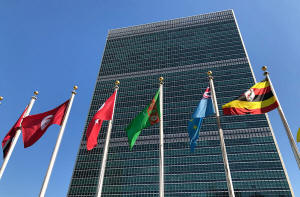Women's rights are under attack 30 years after leaders adopted a
blueprint for equality, UN says
[March 06, 2025]
By EDITH M. LEDERER
UNITED NATIONS (AP) — Thirty years after world leaders adopted a
historic blueprint to achieve gender equality, a new United Nations
report says women’s and girls’ rights are under attack and gender
discrimination remains deeply embedded in economies and societies.
The report released Thursday by the U.N. agency focused on women’s
rights and gender equality found that nearly one-quarter of governments
worldwide reported a backlash to women’s rights last year.
Despite some progress, including on girls’ education and access to
family planning, UN Women said a woman or girl is killed every 10
minutes by a partner or family member and that cases of conflict-related
sexual violence have increased by 50% since 2022. The report, released
ahead of International Women’s Day on Saturday, also noted that only 87
countries have ever been led by a woman.
“Globally, women’s human rights are under attack,” U.N.
Secretary-General Antonio Guterres said in a statement. “Instead of
mainstreaming equal rights, we’re seeing the mainstreaming of misogyny.”
He said the world must stand firm “in making human rights, equality and
empowerment a reality for all women and girls, for everyone,
everywhere.”
The 189 countries that attended a 1995 Beijing women’s conference
adopted a landmark declaration and 150-page platform for action to
achieve gender equality, calling for bold action in 12 areas, including
combating poverty and gender-based violence and putting women at top
levels in business, government and at peacemaking tables.

It also said for the first time in a U.N. document that human rights
include the right of women to control and decide “on matters relating to
their sexuality, including their sexual and reproductive health, free of
discrimination, coercion and violence.”
In the new review, which includes contributions from 159 countries, UN
Women said countries have taken many steps forward on gender equality
and women’s rights in the past five years but that such rights still are
facing growing threats worldwide.
On the positive side, the report said some 88% of countries have passed
laws to combat violence against women and established services to help
victims in the past five years. Most countries have banned workplace
discrimination, and 44% are improving the quality of education and
training for girls and women, it said.
Yet gender discrimination is deeply embedded, with wide gaps in power
and resources that restrain women’s rights, the report said.
[to top of second column]
|

Flags fly outside the United Nations headquarters Sept. 28, 2019.
(AP Photo/Jennifer Peltz, File)

“The weakening of democratic institutions has gone hand in hand with
backlash on gender equality,” UN Women said.
It warned that “anti-rights actors are actively undermining
longstanding consensus on key women’s rights issues” and seeking to
block or slow legal and policy gains they can’t roll back.
UN Women said almost 25% of countries reported that backlash on
gender equality is hampering implementation of the Beijing platform.
According to the report, women have only 64% of the legal rights of
men, and while the proportion of female lawmakers has more than
doubled since 1995, three-quarters of lawmakers are still men.
UN Women also said women aged 15 to 24 lag behind other age groups
on access to modern family planning; maternal mortality ratios have
remained almost unchanged since 2015; and 10% of women and girls
live in extremely poor households.
The U.N. agency said cases of conflict-related sexual violence have
increased 50% since 2022 — and women and girls are victims of 95% of
these crimes.
UN Women Executive Director Sima Bahous said that based on the
report’s findings, the agency has adopted a roadmap to bring the
world closer to the U.N. goal of achieving gender equality by 2030.
It calls for a digital revolution ensuring equal access to
technology for all women and girls; investments in social
protections, including universal health care and quality education
to lift them out of poverty; and zero violence against girls and
women. The roadmap also includes equal decision-making power for
women and financing for “gender-responsive humanitarian aid” in
conflicts and crises.
___
Lederer was AP's lead reporter at the 1995 U.N. women's conference
in Beijing.
All contents © copyright 2025 Associated Press. All rights reserved
 |